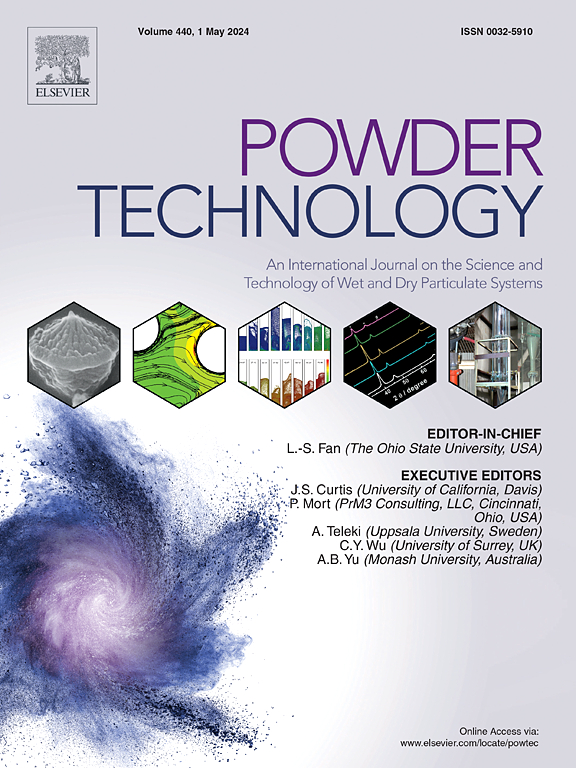Enhancing mixing efficiency and homogeneity by combining anchor and helical ribbon agitators
IF 4.5
2区 工程技术
Q2 ENGINEERING, CHEMICAL
引用次数: 0
Abstract
The anchor mixer and the vertical helical ribbon mixer each offer distinct advantages in terms of mixing efficiency and uniformity. Building on the design of the Anchor Mixer (AM), two new models were developed to obtain a fusion of tangential and axial flow: the Anchor-Inner Helical Ribbon Combined Mixer (AIHRM) and the Anchor-Outer Helical Ribbon Combined Mixer (AOHRM). Numerical simulations and bench tests were conducted to compare the mixing processes and effects of these different mixers. The contact-based and variance-based mixing indices were employed to evaluate the mixing performance. The numerical simulation results demonstrated that the mixing index q reached 0.2 at 10 s within the AOHRM, whereas the AM only achieved a q value of approximately 0.15 at the same interval. The bench test results showed that the coefficient of variation (RSD) for AM decreased from 0.87 to 0.56 with the rotational speed increased, while for AOHRM, the RSD value decreased from 0.66 to 0.37 over the same range of speeds. Meanwhile, the RSD value for AM decreased from 0.96 to 0.40, and for AOHRM, it fell from 0.72 to 0.31 over a different period of mixing time. The combined anchor-helical ribbon mixer significantly obtains a better mixing homogeneity and promotes axial flow. In comparison to the AIHRM, the AOHRM lifts and disperses particles over the particle bed, thereby facilitating more extensive particle position exchange. Additionally, the AOHRM exhibits a wider range of disturbances, which aids in eliminating dead zones at the bottom and sides of the mixing vessel.

求助全文
约1分钟内获得全文
求助全文
来源期刊

Powder Technology
工程技术-工程:化工
CiteScore
9.90
自引率
15.40%
发文量
1047
审稿时长
46 days
期刊介绍:
Powder Technology is an International Journal on the Science and Technology of Wet and Dry Particulate Systems. Powder Technology publishes papers on all aspects of the formation of particles and their characterisation and on the study of systems containing particulate solids. No limitation is imposed on the size of the particles, which may range from nanometre scale, as in pigments or aerosols, to that of mined or quarried materials. The following list of topics is not intended to be comprehensive, but rather to indicate typical subjects which fall within the scope of the journal's interests:
Formation and synthesis of particles by precipitation and other methods.
Modification of particles by agglomeration, coating, comminution and attrition.
Characterisation of the size, shape, surface area, pore structure and strength of particles and agglomerates (including the origins and effects of inter particle forces).
Packing, failure, flow and permeability of assemblies of particles.
Particle-particle interactions and suspension rheology.
Handling and processing operations such as slurry flow, fluidization, pneumatic conveying.
Interactions between particles and their environment, including delivery of particulate products to the body.
Applications of particle technology in production of pharmaceuticals, chemicals, foods, pigments, structural, and functional materials and in environmental and energy related matters.
For materials-oriented contributions we are looking for articles revealing the effect of particle/powder characteristics (size, morphology and composition, in that order) on material performance or functionality and, ideally, comparison to any industrial standard.
 求助内容:
求助内容: 应助结果提醒方式:
应助结果提醒方式:


